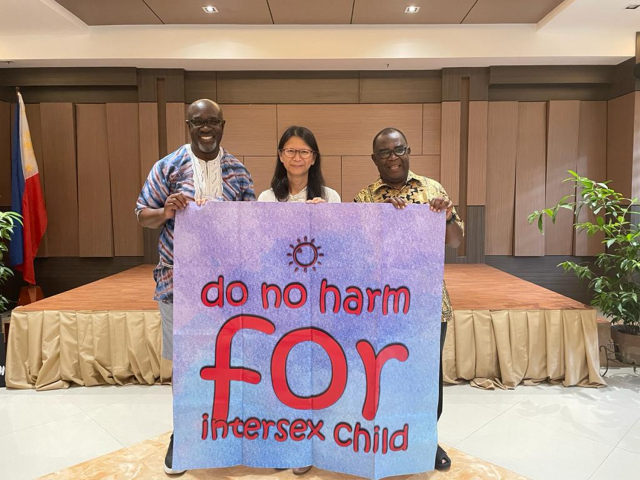Rev. Dr. Japhet Ndhlovu shares the story of Small Luk and her advocacy for intersex people.

In this Pride month, I am reminded that, I was so privileged to be one of the staff participants to a recently held gender and sexuality consultation with our Asian partners. I started organizing for this consultation in my previous role as Global Partnership Coordinator for South East Asia and Southern Africa. When my role changed to providing leadership to the entire Church in Mission Unit as Executive Minister, the work of the Church in Partnership cluster still falls within my purview. It was my honour to orient a new staff member, Amy Zavitz, and hand over the partnerships in the Philippines to her.
After a three-year pandemic-induced delay, United Church of Canada partner organizations in the Philippines welcomed participants to the Asian Consultation on Gender and LGBTQIA+ Justice. Asia, with its tremendous cultural, linguistic, religious, political, and legal diversity, shows a panorama of possibilities and challenges as its people encounter or re-encounter the diversity of sexual orientations and gender identities and expressions in their midst. In the sharing of stories and reflections, this consultation offered me encouragement to continue the struggle for deep solidarity among, and with, people whom too many Christians frequently judge and exclude from their circles.
While at the consultation I met Small Luk. I am sharing this story with her permission. Her story was unique and eye opening for me and other participants. She challenged my limited knowledge with her presentation on intersex—talking about the “I” in 2SLGBTQIA+. Prior to the meeting, I had previously had meetings and read about the “2SLGBTQA,” and not so much on the “I.” To put it simply, I had not met any person who self identifies as Intersex, so the meeting with Small was eye opening and enlightening.
Small shared her story as one of the speakers during the Manila consultation. She also offered further details in my one-on-one time with her. Small was the first child of her family and when she was born, the doctor found that she was intersex, with organs resembling testicles and a penis. Small was deemed male and underwent more than 20 surgeries between the ages of 8 and 13 to construct a urethra—the duct that conducts urine from the bladder. When she was 12, the surgery failed. Small found the surgery too unbearable and attempted suicide several times.
Small was the only surviving person among the seven people who were operated on as children at Hong Kong's Kwong Wah Hospital in the 1970s to "fix" their anatomies. After surgery at the age of 13, Small refused further genital reconstruction.
During adolescence, Small developed breasts, suffered stomach cramps and saw blood in her urine. Doctors explained that her body did not respond to androgen. Small eventually underwent surgery to remove her male genitalia, and now lives as a woman.
Apart from the surgical pain, Small also suffered from bullying. Small was at the receiving end of discrimination from classmates and teachers.
Small founded the organization "Beyond Borders: Knowing and Concerns Intersex" in 2011, and it has been working to spread awareness about intersex people. The aims of the organization are to raise public awareness about intersex people and promote the rights of intersex people, including ending forced genital normalization surgery and conversion therapies. Small urged all participants to return to their countries and educate the public about intersex conditions, to stop discrimination of intersex people, and to stop forcing surgery on intersex children without consulting them. Luk has been invited to various international and local events, including the United Nations meetings to speak on the issue of intersex people and their rights. (Wikipedia, (CC BY-SA 4.0))
At the same consultation, I spoke with a participant from Africa who confirmed to me that stories like that of Luk were also there in Africa, but there was a lot of silence, shame, and stigma associated to having intersex children. Some parents considered it a curse on the family and felt there was no need to talk about it, leaving many children to suffer from forced surgeries depending on the sex that the parents wanted the child to have. Another layer of pain and suffering remains with the children, as they struggle through their lives with their self identity.
Luk reminded all of us that there is need to advocate for a change of laws, so that “intersex” babies don’t have their sex decided for them, like hers was. It is crucial to wait until these children reach the age to make their own choices about whether to have surgery or not, and what their own gender identity should be. Small said, “We too are created in the full image of God. Respect our gender and sexual diversity. No child should endure such an ordeal.”
— Rev. Dr. Japhet Ndhlovu is the Executive Minister for the Church in Mission unit of The United Church of Canada.
The views contained within these blogs are personal and do not necessarily reflect those of The United Church of Canada.